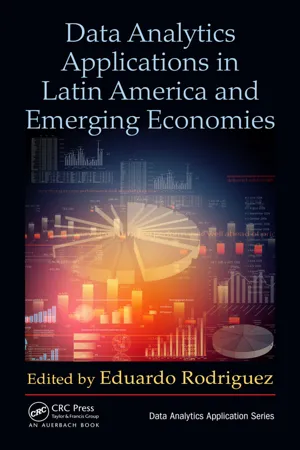Chapter 3
Analytics Knowledge Application to Healthcare
Esteban Flores and Isabel Rodríguez
Contents
Summary
Introduction to Healthcare Data Analytics
How Healthcare Analytics Could Improve Decision Making?
Components of Healthcare Analytics
Motivating Examples
Fraud Prevention
Workflow
Support for Clinical Decisions
Introduction to Healthcare Data Management
Healthcare Data
About Data Quality
About Data Sources
Electronic Health Records
Biomedical Imaging
Sensor Data
Data Description through Statistical Measures and Indicators
Types of Data
Analyzing Data
Application: Fraud Detection in the Mexican Healthcare System
Fundamentals of Healthcare Fraud
Fraud Identification Using Healthcare Data
Solutions to Prevent Frauds Based on Different Statistics Techniques
References
Summary
Currently health institutions generate large volumes of data inherent both to clinical and administrative activities. The Healthcare Data Analytics methodology provides tools for the collection, storage, analysis, and interpretation of data. It is a valuable tool that transforms data into useful knowledge for those responsible for decision making within these organizations. This chapter is divided into four parts: the first part describes the theme of Healthcare Data Analytics in general; how it has evolved; and the current needs that institutions and decision makers have in this area. In the second, an introduction to the management of healthcare data and the desirable characteristics required for these data before any analysis is given. The third part describes how to study data through statistical measures and indicators. Lastly, the methods for detecting and mitigating fraud in health systems are established, particularly in Mexico.
Introduction to Healthcare Data Analytics
Currently institutions involved in health care are concerned with improving the quality of the service they provide to patients and families. However, despite new operational and administrative approaches few health institutions in the world have achieved it. A tool with great potential for helping these institutions achieve the goal is to adequately use the health information systems, which provide evidence to reduce and prevent medical errors through the collection of information about each meeting with the patient in different medical situations.
Sometimes due to constant use these information collection systems can generate data overload. For example, in a radio frequency identification device for diabetes care data are captured quickly because they are sent to the server every minute, collecting information such as the location and blood sugar levels, blood pressure, age, weight of the patient, etc.
Therefore, institutions must have methodologies to benefit from the data available to them and thus improve clinical and administrative attention. Healthcare Analytics has the specific methodology to collect, explore, analyze, and interpret clinical phenomena of health data and to turn them into sustainable information in order to improve health institutions.
The challenge for these institutions is to take advantage of the advancement of medical devices technology as well as of information systems in order to create and sustain improvements in the quality, performance, security, and efficiency of health administration.
Healthcare Analytics technique can also be used to identify new opportunities and to suggest innovative ways to address old challenges. It even gives managers and administrators of healthcare institutions decision-making criteria to undertake optimal actions at the appropriate time and with the appropriate technology.
It has recently been demonstrated in different hospitals worldwide that the incorporation of these methodologies reduces mortality rates, healthcare costs, and medical complications.
How Healthcare Analytics Could Improve Decision Making?
Decision makers need information about the global functioning of the healthcare institution. Besides the information of accomplished fa...
